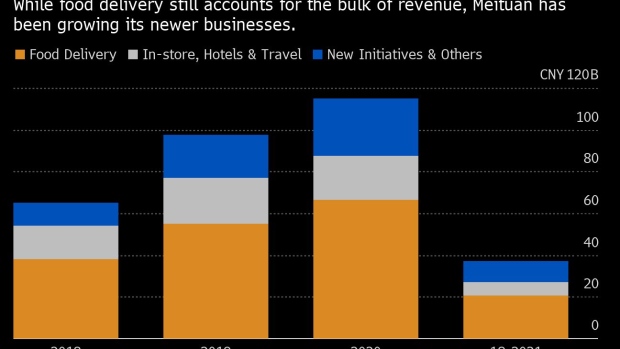Aug 30, 2021
Meituan Shrugs Off Antitrust Probe as Sales Beat Estimates
, Bloomberg News

(Bloomberg) -- Meituan reported revenue that beat estimates, showing how Beijing’s ongoing antitrust probe into the internet giant has yet to weigh on its growth prospects.
China’s largest food delivery platform delivered sales of 43.8 billion yuan ($6.8 billion) for the June quarter, compared with the 42.4 billion yuan average of analyst estimates. The company posted a third straight quarterly net loss of 3.4 billion yuan.
Wang Xing’s internet behemoth is facing fines of roughly $1 billion as part of an investigation by the antitrust watchdog into alleged violations such as forced exclusivity arrangements, Bloomberg News reported this month. Launched days after rival Alibaba Group Holding Ltd. was slapped with a record fine in April, the probe thrust Meituan into the spotlight and marked the expansion of Beijing’s campaign to rein in its technology giants.
Since then, Meituan and its peers have come under sustained fire from regulators for a slew of perceived offenses, ranging from the plight of low-income gig workers to their handling of data security. Despite a pledge by the company earlier this year to provide insurance for its delivery force, regulators have gone even further, asking online food platforms to ensure workers earn at least the local minimum wage, which could weigh on margins.
“Our base case scenario assumes it might take ~5 years to fully implement the potential increase on rider cost,” Citigroup analyst Alicia Yap wrote in a note this month. “While there remain regulatory overhang and financial impacts uncertainty near term, we believe our positive thesis on Meituan for its local services super-app position remains intact and believe Meituan will navigate through the challenges and transform into a reputable and prevailing local service gateway company.”
Citigroup this month cut their share price target for Meituan by 19%. The stock has nearly halved since its February high, wiping out about $160 billion in market value.
Even as regulatory scrutiny intensified, Wang’s firm has splashed out on growing newer businesses including community commerce, an arena that took off during the pandemic. The company’s counting on its Meituan Select division to help it reach a target of adding as many as 400 million over the next few years to the 628.4 million annual transacting users it had in the June quarter.
But competition in the community group buying industry has been stiff. In recent months, several smaller operators have folded or run into trouble, unable to compete with the heavy investments by giants like Meituan, Alibaba and Didi Global Inc. Alibaba this year reorganized its Ele.me food delivery app, Koubei local commerce platform as well as mapping and online travel business into a new lifestyle services division, in a bid to challenge Meituan’s dominance in those sectors.
Meituan and its peers have in recent months announced major philanthropic projects, heeding Beijing’s call to redistribute wealth. In the latest example, Pinduoduo Inc., an e-commerce company known for giving big discounts to customers when they buy produce together, said it will donate all of its first net profit since going public to support the country’s farmers and agricultural areas. In June, Wang pledged $2.3 billion of shares toward education and science, aligning himself with nationwide priorities in speeding technological innovation.
©2021 Bloomberg L.P.





